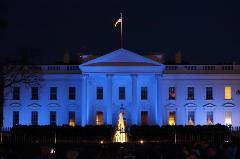 On May 10, CompTIA attended the Artificial Intelligence for American Industry Summit hosted by the White House. Discussion centered around the promise of AI and the policies that are needed to realize that promise for the American people and maintain U.S. leadership in the age of artificial intelligence.
On May 10, CompTIA attended the Artificial Intelligence for American Industry Summit hosted by the White House. Discussion centered around the promise of AI and the policies that are needed to realize that promise for the American people and maintain U.S. leadership in the age of artificial intelligence.
The summit brought together over 100 senior government officials, technical experts from top academic institutions, heads of industrial research labs, and American business leaders who are adopting AI technologies to benefit their customers, workers, and shareholders. Summit attendees had the opportunity to participate in two sets of breakout sessions, focused on cross-cutting issues such as AI research & development (R&D), workforce development, regulatory barriers to AI innovation, and sector-specific applications of AI. Industry sectors represented at the summit included food and agriculture, energy and manufacturing, financial services, healthcare, and transportation and logistics.
During the breakouts, Federal participants had the opportunity to hear firsthand about the latest technological breakthroughs and innovative applications of AI across these sectors. In addition to senior staff from the White House, Federal participants included senior officials from the National Science Foundation, the Office of the Director of National Intelligence, and the Departments of Agriculture, Commerce, Defense, Energy, Health & Human Services, Labor, Transportation, and Treasury.
Key takeaways from breakout discussions included:
· Supporting the national AI R&D ecosystem. America is blessed with a unique R&D ecosystem that taps into the limitless bounds of American ingenuity. Attendees discussed our free market approach to scientific discovery that harnesses the combined strengths of government, industry, and academia and examined new ways to form stronger public-private partnerships to accelerate AI R&D.
· Developing the American workforce to take full advantage of the benefits of AI. AI and related technologies are creating new types of jobs and demand for new technical skills across industries. At the same time, many existing occupations will significantly change or become obsolete. Attendees discussed efforts to prepare America for the jobs of the future, from a renewed focus on STEM education throughout childhood and beyond, to technical apprenticeships, reskilling, and lifelong learning programs to better match America’s skills with the needs of industry.
· Removing barriers to AI innovation in the United States. Overly burdensome regulations do not stop innovation – they just move it overseas. Participants in this session addressed the importance of maintaining American leadership in AI and emerging technologies and promoting AI R&D collaboration among America’s allies. Participants also raised the need to promote awareness of AI so that the public can better understand how these technologies work and how they can benefit our daily lives.
· Enabling high-impact, sector-specific applications of AI. Finally, attendees organized into industry-specific sessions to share the novel ways industry leaders are using AI technologies to empower the American workforce, grow their businesses, and better serve their customers.
A key outcome from the Summit was the creation of the Select Committee on Artificial Intelligence. Committee membership includes: (i) Undersecretary of Commerce for Standards and Technology, Department of Commerce; (ii) Undersecretary of Defense for Research and Engineering, Department of Defense; (iii) Director of the Defense Advanced Research Projects Agency, Department of Defense (Co-Chair); (iv) Undersecretary of Energy for Science, Department of Energy; (v) Director of the National Science Foundation (Co-Chair); (vi) Director of the Intelligence Advanced Research Projects Agency, Office of the Director of National Intelligence.
David Logsdon is CompTIA’s senior director of new and emerging technologies

